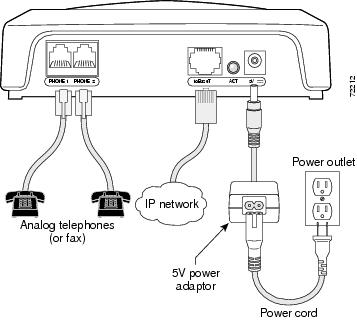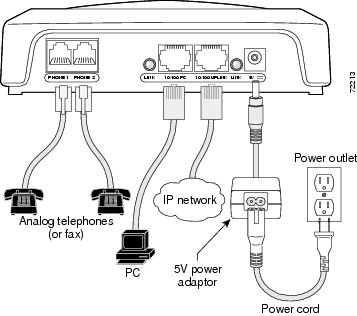- Index
- Preface
- Cisco Analog Telephone Adaptor Overview
- Installing the Cisco ATA
- Configuring the Cisco ATA for MGCP
- Cisco ATA-Supported MGCP Services
- Parameters and Defaults
- Configuring and Debugging Fax Services
- Upgrading the Cisco ATA Signaling Image
- Troubleshooting
- Voice Configuration Menu Codes
- Cisco ATA Specifications
- MGCP Call Flows
- Recommended Cisco ATA Tone Parameter Values by Country
- Glossary
Installing the Cisco ATA
This section provides instructions for installing the Cisco ATA 186 and Cisco ATA 188. Before you perform the installation, make sure you have met the following prerequisites:
•![]() Planned the network and Cisco ATA configuration.
Planned the network and Cisco ATA configuration.
•![]() Installed the Ethernet connection.
Installed the Ethernet connection.
•![]() Installed and configured the other network devices.
Installed and configured the other network devices.
This section contains the following topics:
•![]() What the Cisco ATA Package Includes
What the Cisco ATA Package Includes

Note ![]() The term Cisco ATA is used throughout this manual to refer to both the Cisco ATA 186 and the Cisco ATA 188, unless differences between the Cisco ATA 186 and Cisco ATA 188 are explicitly stated.
The term Cisco ATA is used throughout this manual to refer to both the Cisco ATA 186 and the Cisco ATA 188, unless differences between the Cisco ATA 186 and Cisco ATA 188 are explicitly stated.
Network Requirements
The Cisco ATA acts as an endpoint in an IP telephony network. The following equipment is required:
•![]() Call Control system
Call Control system
•![]() Voice packet gateway—Required if you are connecting to the Public Switched Telephone Network (PSTN).
Voice packet gateway—Required if you are connecting to the Public Switched Telephone Network (PSTN).
•![]() Ethernet connection
Ethernet connection
Safety Recommendations
To ensure general safety, follow these guidelines:
•![]() Do not get this product wet or pour liquids into this device.
Do not get this product wet or pour liquids into this device.
•![]() Do not open or disassemble this product.
Do not open or disassemble this product.
•![]() Do not perform any action that creates a potential hazard to people or makes the equipment unsafe.
Do not perform any action that creates a potential hazard to people or makes the equipment unsafe.
•![]() Use only the power supply that comes with the Cisco ATA.
Use only the power supply that comes with the Cisco ATA.

Warning ![]() Ultimate disposal of this product should be handled according to all national laws and regulations.
Ultimate disposal of this product should be handled according to all national laws and regulations.

Warning ![]() Read the installation instructions before you connect the system to its power source.
Read the installation instructions before you connect the system to its power source.

Warning ![]() The plug-socket combination must be accessible at all times because it serves as the main disconnecting device.
The plug-socket combination must be accessible at all times because it serves as the main disconnecting device.

Warning ![]() Do not work on the system or connect or disconnect cables during periods of lightning activity.
Do not work on the system or connect or disconnect cables during periods of lightning activity.

Warning ![]() To avoid electric shock, do not connect safety extra-low voltage (SELV) circuits to telephone-network voltage (TNV) circuits. LAN ports contain SELV circuits, and WAN ports contain TNV circuits. Some LAN and WAN ports both use RJ-45 connectors. Use caution when connecting cables.
To avoid electric shock, do not connect safety extra-low voltage (SELV) circuits to telephone-network voltage (TNV) circuits. LAN ports contain SELV circuits, and WAN ports contain TNV circuits. Some LAN and WAN ports both use RJ-45 connectors. Use caution when connecting cables.
For translated warnings, see the Regulatory Compliance and Safety Information for the Cisco ATA 186 and Cisco ATA 188 manual.
What the Cisco ATA Package Includes
The Cisco ATA package contains the following items:
•![]() Cisco ATA 186 or Cisco ATA 188 Analog Telephone Adaptor
Cisco ATA 186 or Cisco ATA 188 Analog Telephone Adaptor
•![]() Read Me First - ATA Boot Load Information
Read Me First - ATA Boot Load Information
•![]() Cisco ATA 186 and Cisco ATA 188 Analog Telephone Adaptor at a Glance
Cisco ATA 186 and Cisco ATA 188 Analog Telephone Adaptor at a Glance
•![]() Regulatory Compliance and Safety Information for the Cisco ATA 186 and Cisco ATA 188
Regulatory Compliance and Safety Information for the Cisco ATA 186 and Cisco ATA 188
•![]() 5V power adaptor
5V power adaptor
•![]() Power cord
Power cord

Note ![]() The Cisco ATA is intended for use only with the 5V DC power adaptor that comes with the unit.
The Cisco ATA is intended for use only with the 5V DC power adaptor that comes with the unit.
What You Need
You also need the following items:
•![]() Category-3 10BASE-T or 100BASE-T (or better) Ethernet cable. One cable is needed for each Ethernet connection.
Category-3 10BASE-T or 100BASE-T (or better) Ethernet cable. One cable is needed for each Ethernet connection.
A Category-3 Ethernet cable supports 10BASE-T for up to 100 meters without quality degradation, and a Category-3 Ethernet cable supports 100BASE-T for up to 10 meters without quality degradation.
For uplink connections, use a crossover Ethernet cable to connect the Cisco ATA to another Ethernet device (such as a router or PC) without using a hub. Otherwise, use straight-through Ethernet cables for both uplink and data port connections.
•![]() Access to an IP network
Access to an IP network
•![]() One or two analog touch-tone telephones or fax machines, or one of each
One or two analog touch-tone telephones or fax machines, or one of each
Installation Procedure
After the equipment is in place, see Figure 2-1 (for Cisco ATA 186) or Figure 2-2 (for Cisco ATA 188) and follow the next procedure to install the Cisco ATA.
Figure 2-1 Cisco ATA 186 Rear Panel Connections

Figure 2-2 Cisco ATA 188 Rear Panel Connections

Procedure
Step 1 ![]() Place the Cisco ATA near an electrical power outlet.
Place the Cisco ATA near an electrical power outlet.
Step 2 ![]() Connect one end of a telephone line cord to the Phone 1 input port on the rear panel of the Cisco ATA. Connect the other end to an analog telephone set.
Connect one end of a telephone line cord to the Phone 1 input port on the rear panel of the Cisco ATA. Connect the other end to an analog telephone set.
If you are connecting a telephone set that was previously connected to an active telephone line, unplug the telephone line cord from the wall jack and plug it into the Phone 1 input.

Warning ![]() To reduce the risk of fire, use only No. 26 AWG or larger telecommunication line cord.
To reduce the risk of fire, use only No. 26 AWG or larger telecommunication line cord.


Note ![]() The telephone must be switched to tone setting (not pulse) for the Cisco ATA to operate properly.
The telephone must be switched to tone setting (not pulse) for the Cisco ATA to operate properly.
Step 3 ![]() (Optional) Connect the telephone line cord of a second telephone to the Phone 2 input port.
(Optional) Connect the telephone line cord of a second telephone to the Phone 2 input port.

Note ![]() If you are connecting only one telephone to the Cisco ATA, you must use the Phone 1 input port.
If you are connecting only one telephone to the Cisco ATA, you must use the Phone 1 input port.
Step 4 ![]() Connect an Ethernet cable to the uplink RJ-45 connector on the Cisco ATA. For the Cisco ATA 186, this is the 10BASE-T connector; for the Cisco ATA 188, this is the 10/100UPLINK connector.
Connect an Ethernet cable to the uplink RJ-45 connector on the Cisco ATA. For the Cisco ATA 186, this is the 10BASE-T connector; for the Cisco ATA 188, this is the 10/100UPLINK connector.

Note ![]() Use a crossover Ethernet cable to connect the Cisco ATA to another Ethernet device (such as a router or PC) without using a hub. Otherwise, use a straight-through Ethernet cable.
Use a crossover Ethernet cable to connect the Cisco ATA to another Ethernet device (such as a router or PC) without using a hub. Otherwise, use a straight-through Ethernet cable.
Step 5 ![]() (Cisco ATA 188 only—optional) Connect a straight-through Ethernet cable from your PC to the 10/100 PC RJ-45 connector on the Cisco ATA.
(Cisco ATA 188 only—optional) Connect a straight-through Ethernet cable from your PC to the 10/100 PC RJ-45 connector on the Cisco ATA.
Step 6 ![]() Connect the socket end of the power cord to the Cisco-supplied 5V DC power adaptor.
Connect the socket end of the power cord to the Cisco-supplied 5V DC power adaptor.
Step 7 ![]() Insert the power adaptor cable into the power connector on the Cisco ATA.
Insert the power adaptor cable into the power connector on the Cisco ATA.


Warning ![]() This product relies on the building's installation for short-circuit (overcurrent) protection. Ensure that a fuse or circuit breaker no larger than 120 VAC, 15A U.S. (240VAC, 10A international) is used on the phase conductors (all current-carrying conductors).
This product relies on the building's installation for short-circuit (overcurrent) protection. Ensure that a fuse or circuit breaker no larger than 120 VAC, 15A U.S. (240VAC, 10A international) is used on the phase conductors (all current-carrying conductors).
Step 8 ![]() Connect the plug end of the 5V DC power adaptor cord into an electrical power outlet.
Connect the plug end of the 5V DC power adaptor cord into an electrical power outlet.
When the Cisco ATA is properly connected and powered up, the green activity LED flashes to indicate network activity. This LED is labeled ACT on the rear panel of the Cisco ATA 186 and is labeled LINK on the rear panel of the Cisco ATA 188.

For more information about LEDs and the function button, see the "Hardware Overview" section.
Power-Down Procedure

Procedure
Step 1 ![]() Unplug the RJ45 Ethernet cable
Unplug the RJ45 Ethernet cable
Step 2 ![]() Wait for 20 seconds.
Wait for 20 seconds.
Step 3 ![]() Unplug the power cable.
Unplug the power cable.

Warning ![]() This equipment contains a ring signal generator (ringer), which is a source of hazardous voltage. Do not touch the RJ-11 (phone) port wires (conductors), the conductors of a cable connected to the RJ-11 port, or the associated circuit-board when the ringer is active. The ringer is activated by an incoming call.
This equipment contains a ring signal generator (ringer), which is a source of hazardous voltage. Do not touch the RJ-11 (phone) port wires (conductors), the conductors of a cable connected to the RJ-11 port, or the associated circuit-board when the ringer is active. The ringer is activated by an incoming call.
 Feedback
Feedback